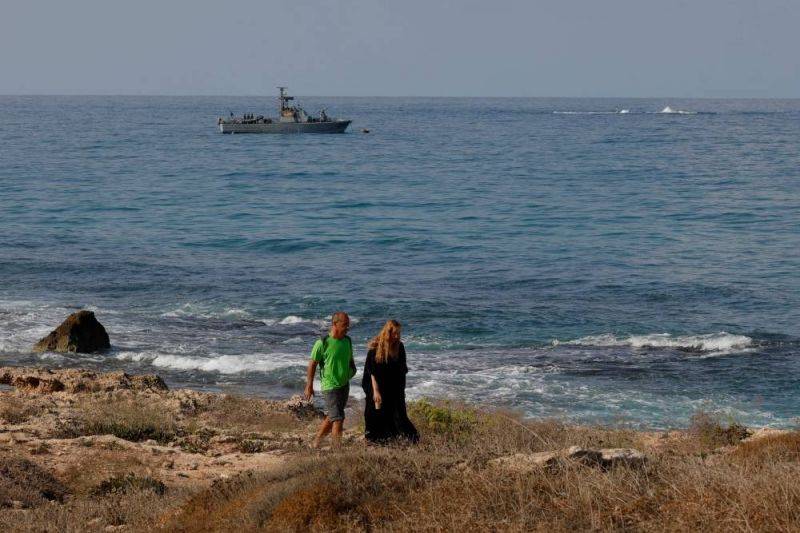
An Israeli navy ship on patrol in the Mediterranean waters near the Lebanese village of Ras al-Naqoura, South Lebanon, on Oct. 7, 2022. (Credit: Jalaa Marey/AFP)
Want to get the Morning Brief by email? Click here to sign up.
Lebanon received from the US the final draft of the Lebanese-Israeli maritime border deal, Deputy Parliament Speaker and Lebanon’s lead negotiator Elias Bou Saab told Reuters Tuesday morning. “If everything goes well, Amos Hochstein's efforts could imminently lead to a historic deal,” Bou Saab also said. Israel’s national security advisor, who headed the country’s negotiating team, said in a statement Tuesday: "All our changes were met, the changes that we asked for were corrected. We protected Israel’s security interests and are on our way to a historic agreement." Last week, Lebanon delivered to US officials a modified version of Hochstein’s proposal on maritime borders after having received it a few days prior following drawn-out indirect negotiations. If the final deal is signed, it could allow Lebanon, currently struggling amid an unprecedented economic crisis, to explore its potential offshore gas reserves, which are yet to be found.
The total number of confirmed cholera cases in Lebanon reached 18 as of Monday night, a Health Ministry spokesperson told L’Orient Today, a day after caretaker Health Minister Firass Abiad warned the illness would spread rapidly “in the absence of safe and clean water.” Of the 18 cholera cases recorded so far, four were confirmed Monday in Arsal, a town in northeastern Lebanon, while the other 14 cases are all in the Akkar governorate in the country's north, the ministry spokesperson said. Abiad on Sunday inspected a water treatment plant, a refugee camp and hospitals in northern Lebanon, after the country recorded on Thursday its first case of cholera since a 1993 outbreak. "These cases are likely due to a serious epidemic in Syria, and were brought by travelers who crossed the porous border between the two countries," Abiad said. The health minister emphasized the need to maintain power supply for water infrastructure, in the absence of which citizens would turn to “unsecured sources.” Electricity supply deficits have previously caused water shortages across Lebanon. The Health Ministry announced an upcoming initiative allowing citizens to check water potability.
Higher Judicial Council head Soheil Abboud announced on Monday that he is boycotting today’s council meeting to protest alleged “political interferences” that “contribute to damaging the trust in the judicial performance.” Caretaker Justice Minister Henry Khoury has convened the council to, among other tasks, appoint an alternate judge to rule on the status of detainees in the Aug. 4, 2020 port blast investigation. This task in particular is an indication of “interference” in the case, Abboud claimed. The decision to appoint an alternate judge was met with criticism from blast victims’ families and members of the judiciary alike. However, relatives of detainees held in the blast probe welcomed the appointment as around 15 people remain in custody without trial for a second year while the investigation is suspended. The appointment would not remove Judge Tarek Bitar as lead investigator, though he is unable to proceed with the probe pending rulings on complaints filed against him by suspects he named in the investigation. Abboud added that further evidence of interference could be found in the process of appointing judges to the plenary assembly of the Court of Cassation — which lost quorum following the retirement of several members and consequently prevented rulings from being issued on the complaints against Bitar.
“Women and all segments of society can no longer be severed ... We support women's struggles for liberation in Iran,” Hanan Othman said, representing the Nowruz Cultural Association in Lebanon at a sit-in Sunday condemning the death of Mahsa Amini in Iranian custody. Othman’s statement came during a demonstration in front of one of the United Nations offices in Beirut’s Riad al-Solh square, organized by members of the Kurdish community in Lebanon. Mahsa Amini, who was Kurdish, died after being detained by the Iranian morality police, sparking a wave of protests since mid-September. Last Sunday, several dozen activists organized a sit-in outside the National Museum of Beirut, joining a series of international demonstrations in solidarity with protests in Iran echoing Iranian protesters’ chants of “women, life, freedom" and "death to the dictator," in reference to Iranian Supreme Leader Ali Khamenei.
In case you missed it, here's our must-read story from yesterday: “How did Lebanon deal with cholera outbreaks in the past?”
Compiled by Abbas Mahfouz